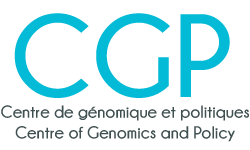Profile
Charles Dupras
Dr. Charles Dupras holds a bachelor's degree (BSc) in biochemistry and biotechnology from UQTR, a master's degree (MSc) in experimental health sciences from INRS, a propaedeutic degree in bioethics, and a doctorate (PhD) in bioethics from the University of Montreal. He completed postdoctoral fellowships in philosophy at the Centre for Research in Ethics and in law at the Centre for Genomics and Policy at McGill University. He then worked as a senior research ethics advisor at the Secretariat on Responsible Conduct of Research for federal research funding agencies (CIHR, SSHRC, NSERC).
Dr. Dupras has served as an ethicist on the scientific council of the Institut national d'excellence en santé et services sociaux (INESSS) and on the research ethics committees of Health Canada and the Public Health Agency of Canada (PHAC). He currently sits on the advisory committees of the Canadian Journal of Bioethics and the International Observatory on Genetic Discrimination, and on the Bioethics Workgroup of the International Human Epigenome Consortium (IHEC). He is an assistant professor in the Department of Social and Preventive Medicine (DMSP) and head of bioethics programs at the University of Montreal School of Public Health (ESPUM). He is also affiliated as a researcher with the Centre for Public Health Research (CReSP) and as a co-researcher with the Centre for Research in Ethics (CRÉ).
His main research focus is on epistemological issues and the ethical, legal, and societal challenges associated with the development of complementary sciences to genetics and the transition to a “multi-omic” approach in research and health. He is generally interested in issues arising from genetic exceptionalism and the absence of laws, policies, or guidelines governing research and emerging technologies in epigenetics, microbiomics, and other sciences that can provide information about the biology, health, and lives of individuals or groups.
To date, his research has focused on several topics, such as the relationship between social and biological health inequalities, the identification of risks to privacy, the prevention of stigmatization and discriminatory practices based on biological variants or markers, the ethical and social acceptability of new reproductive technologies, direct-to-consumer testing, the use of artificial intelligence, and public health crisis management. He has employed a variety of methodological approaches, both conceptual and empirical. He has developed solid experience with Delphi studies, a mixed-method (qualitative and quantitative) approach that allows experts and stakeholders to be consulted on specific issues.
Dr. Dupras is also interested in the epistemic status of bioethics as a field of study and practice. Over the next few years, he plans to further explore the impact of biases of all kinds that can affect scientific research, the application of technologies, and also reflection and discussions in bioethics. In the era of the “One Health” approach, he also hopes to promote dialogue and reflection at the intersection of bioethics and environmental ethics.

